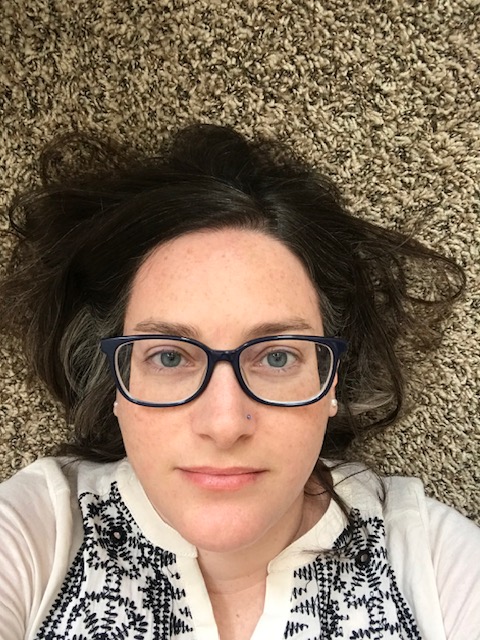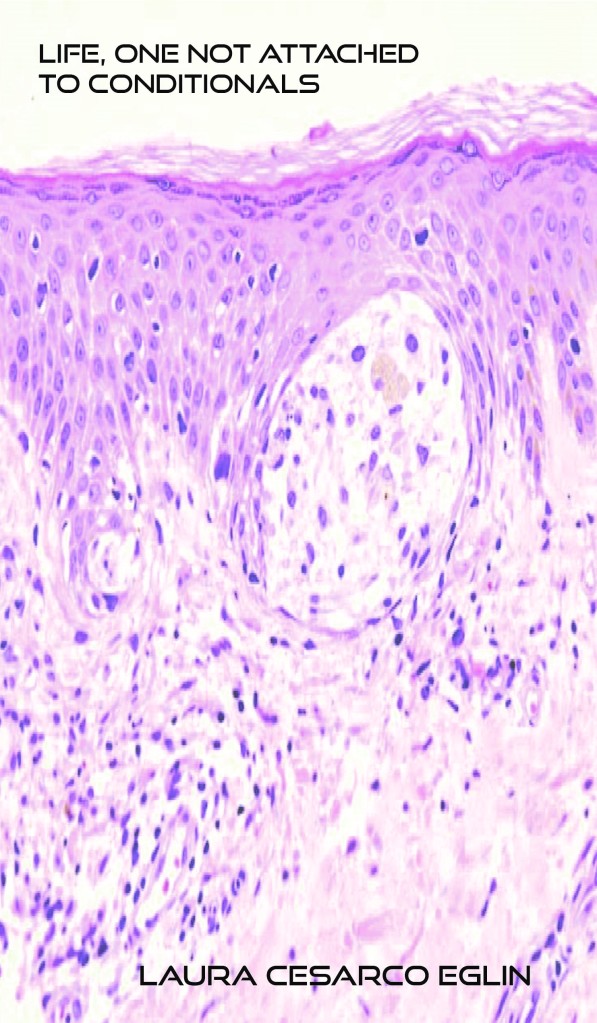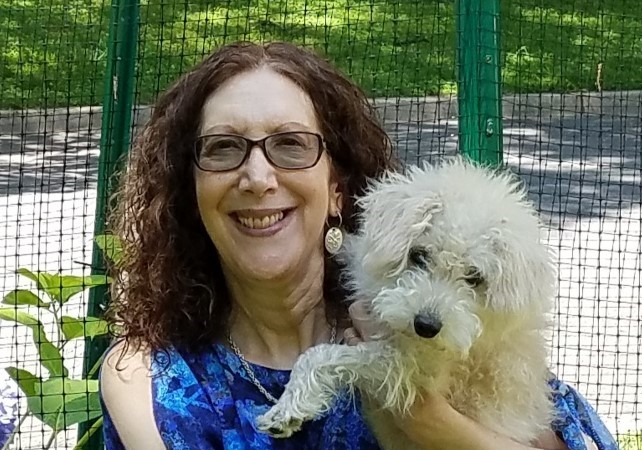Life, One Not Attached to Conditionals by Laura Cesarco Eglin
A whole body of literature exists that focuses on the body. Indeed, one might make the assertion that all literature does so, in one way or another— enraptured body, dying body, panicked body, betrayed body, and, as in the case of Life, One Not Attached to Conditionals by Laura Cesarco Eglin (Thirty West Publishing House, 2020), body as betrayer.
Because I, too, have gone through, and written about “the cancer experience,” I was particularly drawn to this chapbook. I was curious to see how cancer could be the subject of a collection of poems without it spreading into all aspects of what makes a book cohesive and alive, i.e., a sense of tension between themes, linguistic risks, and tone (to name a few). Cesarco Eglin contrasts her subject matter’s doom and gloom with the urge to live her still-young life despite the ever-present shadows. The dark humor infused in these poems also underscores the seriousness of their themes. For example, in “Articulating the Changes in My Body,” Cesarco Eglin, a fine translator herself, compares her scars to Morse code:
I’m thinking about the Morse code as a
possible alphabet to get through, to get by,
to translate.
She then gives a graphic representation of Morse-code-as-scar.
It’s easy for poems about illness to veer off into sentimentality or self-absorption, but Cesarco Eglin masterfully negotiates the geography of living an unconditional life, despite her multiple bouts with melanoma, and despite the need “to guard [each] new spot ‘like a hawk.’” In this pandemic year, many of us are directly experiencing the need to be extra-vigilant to avoid contracting the virus, which makes this new chapbook of poems particularly relevant. Cesarco Eglin can never escape “the doctor’s voice in [her] head: it will come back.” She reminds us that “there is no vacation from being alert.” Indeed, in an existential stance to confront the absurdity of the human condition, she instructs us on how to take control of the uncontrollable, and writing is her chosen strategy. She offers us this wisdom:
One scar, then another;
that’s two lines already:
a couplet written in five months,
a couplet that promises
to be the beginning of a lifetime
of poetry.
Melanoma, her muse, has provided her with the motivation to be “aware of any little change in color, shape, texture, dimension, state, mode or mood of any mole or stain or spot on [my] body.” Cesarco Eglin, who was born in Uruguay and is fluent in Spanish and English as well as other languages, is open to melanoma teaching her the language of the body—learning it well enough to eventually call herself “a native speaker.” She’s trying to learn to embrace her scars, and compares them to bridges, as she brilliantly transforms the threatening juxtaposition of “bridge” and “attempt” to a life-affirming choice:
Many bridges, an attempt
to keep me in one piece;
an attempt to keep me
alive long enough
to cross them all.
In these days of COVID-19, we could all use something to help us cross these bridges—something to remind us to keep believing there are still “skies and wonders.”
The Reviewer posed some questions to the author about her book:
Nancy Naomi Carlson: What about Life, One Not Attached To Conditionals is uniquely suited to the chapbook form?
Laura Cesarco Eglin: I felt that a shorter form would suit Life, One Not Attached to Conditionals as a way to, at least in language, be able to finish the cycle, end the struggle psychologically, intellectually, and emotionally. Intense, short, and move on to life, one not attached to conditionals.
NMC: I notice that “translation” is one of the themes of Life. How did your work as a translator (and an author who is translated) impact your writing this chapbook?
LCE: Experience translated into language. Poetry as a means to question, challenge, and rearrange thoughts and experiences. Translation as a form of reading deeply, analyzing.
NMC: Writing about illness seems to be a tried-and-true genre, but is also an emerging one, as the landscape of disease is ever-shifting. Were you influenced by other writings on this topic?
LCE: More than influenced on writings on this particular topic for this particular chapbook, I would say that I am always influenced by all the books I read. I think that goes without saying. But there are two books in particular that I’d like to highlight. They deal with overcoming a loved one’s death or suicide: Ghost of by Diana Khoi Nguyen and Instead of Dying by Lauren Haldeman.
NMC: Can you say something about your wonderful title (e.g., how it came about; when, in the process of writing, it came to you…)
LCE: The title comes from a line in “Recovery,” a poem in Life, One Not Attached to Conditionals. I did not set out to write a poetry collection about having melanoma and skin cancer repeatedly and what that meant. I was writing poems and they, understandably, had that focus. The process of editing, rereading, changing, rewriting brings new perspectives, and when I read that line I perceived that it encapsulates the compass, as well as the power I think language has.
TITLE: Life, One Not Attached to Conditionals
AUTHOR: Laura Cesarco Eglin
PUBLISHER: Thirty West Publishing House, 2020
PRICE: $11.99
BUY IT !!


Laura Cesarco Eglin is a poet and translator. She is the author of three collections of poetry: Calling Water by Its Name, translated by Scott Spanbauer (Mouthfeel Press, 2016), Sastrería (Yaugurú, 2011), and Reborn in Ink,translated by Catherine Jagoe and Jesse Lee Kercheval (The Word Works, 2019). She has also published three chapbooks: Life, One Not Attached to Conditionals (Thirty West Publishing House, 2020), Occasions to Call Miracles Appropriate (The Lune, 2015) and Tailor Shop: Threads, co-translated with Teresa Williams (Finishing Line Press, 2013). Her poems, as well as her translations (from the Spanish, Portuguese, Portuñol, and Galician), have appeared in a variety of journals, including Asymptote, Modern Poetry in Translation, Eleven Eleven, Puerto del Sol, Copper Nickel, Spoon River Poetry Review, Arsenic Lobster, International Poetry Review, Tupelo Quarterly, Columbia Poetry Review, Blood Orange Review, Timber, Pretty Owl Poetry, Pilgrimage, Periódico de Poesía, and more. Cesarco Eglin is the translator of Of Death. Minimal Odes by the Brazilian author Hilda Hilst (co•im•press), winner of the 2019 Best Translated Book Award in Poetry. She co-translated from the Portuñol Fabián Severo’s Night in the North (EulaliaBooks, 2020). She is the co-founding editor and publisher of Veliz Books.

Nancy Naomi Carlson, poet, translator, essayist, and editor, has authored 10 titles (six translated). An Infusion of Violets (Seagull Books, 2019), her second full-length collection of poetry, was named “New & Noteworthy” by the New York Times. A recipient of two NEA literature translation fellowships, she was a finalist for the Best Translated Book Award, and the CLMP Firecracker Poetry Award. An associate editor for Tupelo Press, her work has appeared in such journals as APR, The Georgia Review, The Paris Review, and Poetry. www.nancynaomicarlson.com
Risa Denenberg is the curator at The Poetry Cafe Online.

